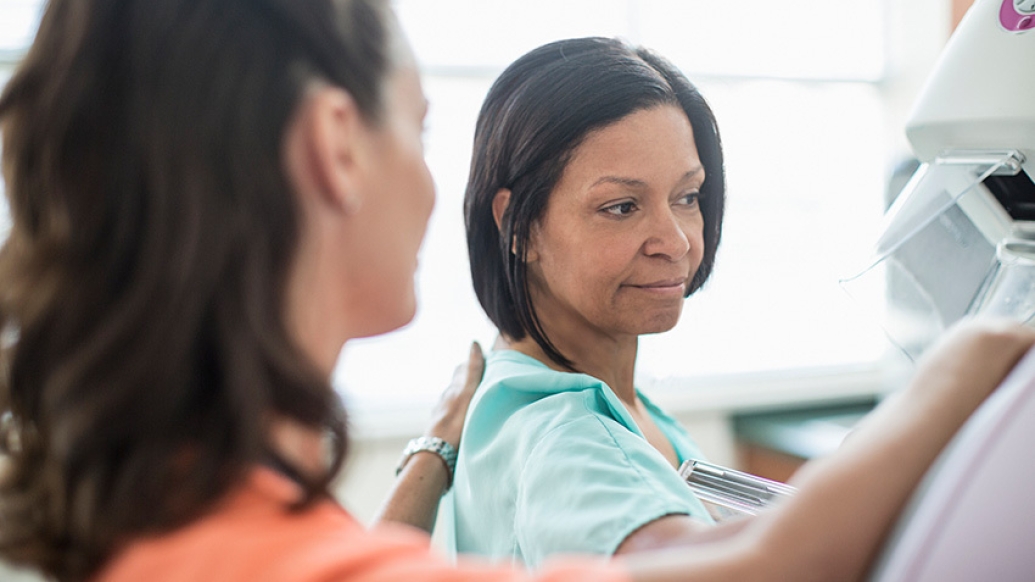Researchers determined that biennial screenings beginning at this age could reduce breast cancer deaths by 57%.
11:10 AM
Author |

If Black women began mammography screening every other year starting at age 40, breast cancer deaths could be reduced by 57% compared to if they started screening 10 years later, according to a research team led by Michigan Medicine.
The analysis is the first to use modeling to determine modern breast cancer screening strategies that best achieve equity in screening outcomes and reduce mortality disparities.
The research, published in Annals of Internal Medicine, suggests that a reduction in breast cancer deaths can be achieved for Black women while maintaining the same ratio of benefits to harms that occurs when white women undergo screening every other year starting at age 50.
Researchers say the national recommendations over the past two decades have not accounted for the role of racism — structural, interpersonal, or internalized — and its impact on breast cancer treatment, length of survival and deaths among Black women. However, the United States Preventive Services Task Force is undergoing a review of its breast cancer screening recommendation that may incorporate factors such as racism into its upcoming guidance.
"There is an increasing focus on eliminating race-based medicine," said Christina Hunter Chapman, M.D., M.S., adjunct assistant professor in the Department of Radiation Oncology at the University of Michigan Medical School and the first author of the study. "However, calls to end race-based medicine that ask for the immediate cessation of any discussion on race are not likely to eliminate racial disparities. Carefully selected solutions for health inequity may involve tailoring interventions to specific racial groups."
To address this issue, the researchers, who are part of the NCI-sponsored Cancer Intervention and Surveillance Modeling Network, developed a model using self-reported race as a proxy for who is likely to experience the effects of racism to test a range of screening strategies. The model also considered breast density, distribution of breast cancer molecular subtypes, age-, stage- and subtype-specific treatment effects, and non-breast cancer mortality for Blacks and whites. Using all of these data, the model compared the benefits and harms of different screening strategies in Black women to those for white women screened every other year from ages 50-74.
Carefully selected solutions for health inequity may involve tailoring interventions to specific racial groups.Christina Chapman, M.D.
"For Black women, three biennial screening strategies (beginning at age 40, 45, or 50) yielded benefit-to-harm ratios that were greater than or equal to those seen in white women who started screening at age 50," Chapman said. "Among those three strategies, initiating mammograms at age 40 yielded the greatest mortality reduction and reduced Black-white mortality disparities by 57 percent. This approach is consistent with the U.S. Preventive Services Task Force's overarching guidance for when women may want to consider beginning biennial mammography."
The model the researchers used projected the lifetime impact of digital mammography under different starting ages and intervals between screenings for women who would be age 40 in the year 2020 (i.e., born in the U.S. in 1980.) It compared a variety of benefits (number of years of life gained by detecting cancer early, breast cancer deaths averted and mortality reduction) to harms like undergoing a larger number of mammograms (e.g., annual vs. biennial screening) and having false positive screening results.
"In the future, the harms of racism in medicine may be better rectified by developing interventions that use more direct measures of racism as instead of race," Chapman concludes. "However, using socioeconomic status alone as a proxy for race would not be appropriate in a study like ours given that racial disparities in breast cancer are observed across socioeconomic strata."
"We hope this provides new information to help develop equity-focused recommendations for Black women and address a long-standing deficit in breast cancer screening guidelines due to the lack of data," said the study's senior author, Jeanne S. Mandelblatt, M.D., M.P.H., professor of medicine and oncology at Georgetown Lombardi Comprehensive Cancer.
Additional authors include Christopher J. Cadham at Georgetown Lombardi; Reshma Jagsi at Michigan Medicine; Amy Trentham-Dietz and Ronald E. Gangnon at the University of Wisconsin-Madison; and Clyde B. Schechter at Albert Einstein College of Medicine, Bronx, New York.
A version of this story was originally published on the Georgetown Lombardi Comprehensive Cancer Center's website.
Paper cited: "Identifying Equitable Screening Mammography Strategies for Black Women in the United States Using Simulation Modeling," Annals of Internal Medicine. DOI: 10.7326/M20-6506

Explore a variety of healthcare news & stories by visiting the Health Lab home page for more articles.

Department of Communication at Michigan Medicine
Want top health & research news weekly? Sign up for Health Lab’s newsletters today!





